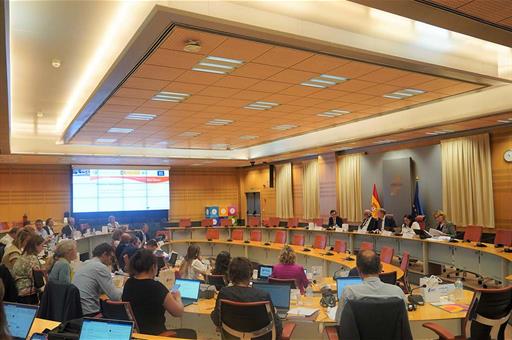In Madrid
EU road safety policy-makers meet to make progress in consolidating the European Road Safety Area
News - 2023.9.20
The meeting brings together traffic and road safety officials from the 27 Member States and the European Commission, and the traffic authorities of Catalonia and the Basque Country are invited to attend.
The conference was opened by Kristian Schmidt, Director of Land Transport for the European Commission and European Road Safety Coordinator, and Pere Navarro, Director of the Directorate General of Traffic.
Schmidt thanked Spain for holding the conference in Madrid to coincide with the Spanish Presidency of the EU and highlighted the value of meetings like the one held today, "as they allow us to reflect on EU and national approaches to reducing road traffic deaths, and give us a forum for exchanging knowledge, good practices and experiences in order to benefit the mobility and safety of European citizens on their journeys".
The European Road Safety Coordinator also pointed out that, as we approach the halfway point of the EU Road Safety Policy Framework 2021-2030, it is important to focus on the actions needed to reduce road traffic accidents: "Europe may be the safest region in the world, but almost 20,000 people still die on EU roads every year. Determined implementation of national and EU road safety strategies is essential if we are to reach our goal of zero fatalities by 2050 within the context of dynamic and ever-changing mobility".
The EU Road Safety Coordinator congratulated Spain for its road safety efforts, which have reduced road fatalities faster than the EU average over the past 20 years. An important example of this is the initiative to implement a speed limit of 30 km/h in cities, a pioneering measure that other countries in Europe are interested in studying.
He also highlighted Spain's important role in cooperation programmes with other countries, such as the EU Road Safety Exchange project; with initiatives such as European Mobility Week, which is being held this week; and the active participation of many Spanish stakeholders in the European Road Safety Charter.
For his part, the Director of the Directorate General of Traffic, Pere Navarro, welcomed all the participants and thanked the European Commission for the assistance that has helped Spain to implement the safety policy. "Without the European Union, without its directives and recommendations, the progress made to combat road traffic accidents and their dramatic consequences would not have been possible."
He also highlighted the important role of the High Level Group, "a group created last century in the 1990s and which is not only still active thirty years later, but its role as a forum for exchanging good practices is more solid than ever, as today's meeting demonstrates".
He also thanked the European Commission for the trust it has placed in Spain to advise on how to adopt measures to help reduce the accident rate in other EU countries. Greece, Romania and Bulgaria are among the countries receiving advice in areas such as motorist safety, automated surveillance and road safety training.
Pere Navarro then briefly explained the challenges facing road safety in Spain, on which most of the efforts are focused: motorcyclists, off-road accidents, road accidents, vulnerable road users and alcohol and drugs, many of which are shared by other Member States, and others that are more specific to Spain, as is the case with motorcyclists.
He also acknowledged the Group's responsiveness in including three technical sessions dedicated to road accidents and vulnerable road users, with the presentation of good practices that have been carried out in some Member States to reduce the accident rate among these groups.
On the other hand, the Traffic Director took advantage of the international forum to thank Spanish civil society for their commitment to road safety. "We can proudly say that Spain is the EU country with the most activities during the European Mobility Week, which is currently taking place, with over 400 initiatives, and the country with the most public and private entities committed to the European Road Safety Charter".
To conclude, Pere Navarro highlighted how technological advances have helped to bring about progress in road safety over the last decade. "The development of connected vehicles and ADAS must be the great leap forward in improving road safety", which is why the DGT has made a firm commitment to connectivity. This connectivity is already becoming a reality with the DGT 3.0 project, a finalist in the European Road Safety Excellence Awards, which will be announced in the coming weeks".
Non official translation





